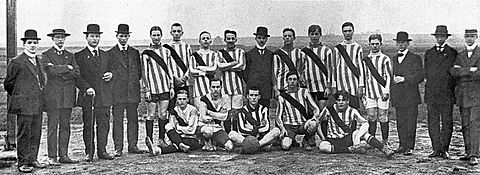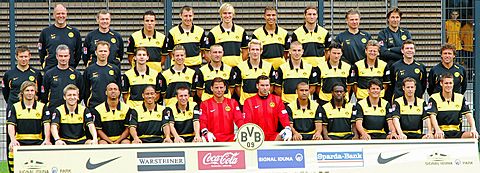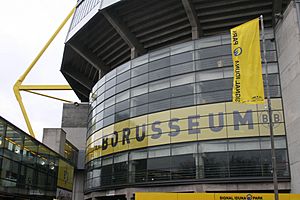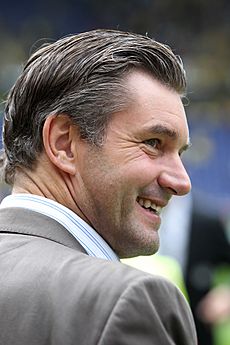Borussia Dortmund facts for kids
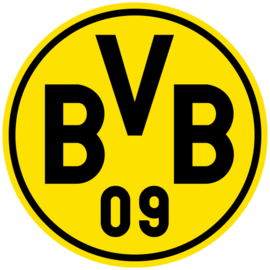 |
||||
| Full name | Ballspielverein Borussia 09 e. V. Dortmund | |||
|---|---|---|---|---|
| Nickname(s) | Die Borussen (The Prussians) Die Schwarzgelben (The Black and Yellow) |
|||
| Short name | BVB | |||
| Founded | 19 December 1909 | |||
| Ground | Signal Iduna Park | |||
| Capacity | 81,365 | |||
| President | Reinhold Lunow | |||
| CEO | Lars Ricken | |||
| Head coach | Niko Kovač | |||
| League | Bundesliga | |||
| 2020–21 | Bundesliga, 3rd of 18 | |||
|
||||
| Traded as | SDAX |
|---|
Ballspielverein Borussia 09 e. V. Dortmund, usually called Borussia Dortmund or just BVB, is a German professional sports club. It is based in Dortmund, North Rhine-Westphalia. The club is most famous for its men's professional football team. This team plays in the Bundesliga, which is the top football league in Germany.
The club was started in 1909 by eighteen football players from Dortmund. Their nickname is Die Schwarzgelben, which means "The Black and Yellow". This comes from the colors of their club crest. Borussia Dortmund has a big rivalry with Schalke 04, their neighbors from the Ruhr area. This match is called the Revierderby. They also have a famous rivalry with Bayern Munich, known as Der Klassiker.
Borussia Dortmund is the second largest sports club in Germany by members, after Bayern Munich. It has about 218,000 members. This makes it the fifth largest sports club in the world. The club also has a women's handball team. Since 1974, Dortmund has played its home games at the Westfalenstadion. This stadium is the biggest in Germany. Its "Yellow Wall" standing area is the largest of its kind in Europe. Dortmund also has the highest average attendance of any football club in the world.
Dortmund is the second most successful German football team. In Germany, they have won eight league championships, five DFB-Pokals (German Cups), and six DFL-Supercups. On the international stage, they won the UEFA Champions League in 1997. They also won the European Cup Winners' Cup in 1966 and the Intercontinental Cup in 1997. They were also runners-up in the Champions League in 2013 and 2024. They were also runners-up in the UEFA Europa League (formerly the UEFA Cup) in 1993 and 2002.
In the 2010s, under Michael Zorc, Dortmund became known for finding and developing young football stars. They still focus on growing their youth system. In 2024, Dortmund had the second highest income among German football clubs. They were also the 12th highest earning football team in the world, according to Deloitte's Football Money League.
Contents
- Club History: How BVB Started and Grew
- Club Identity and Supporters
- Home Grounds: Where BVB Plays and Trains
- Club Finances and Organization
- Team Kits and Sponsors
- Charity Work: BVB Giving Back
- Players: Meet the Team
- Coaching Staff: The People Behind the Team
- Records: BVB's Achievements and Milestones
- Honours: BVB's Trophies
- Affiliated Clubs: BVB's Global Connections
- Women's Team
- See also
Club History: How BVB Started and Grew
Beginning Years and Early Challenges
The club began on December 19, 1909. A group of young men started it because they were not happy with their church-sponsored football team. The local priest tried to stop their first meeting at a pub called Zum Wildschütz, but they kept him out. The name Borussia comes from a local beer, which was named after Prussia.
At first, the team wore blue and white striped shirts with a red sash, and black shorts. In 1913, they changed to their famous black and yellow stripes. For many years, the club only had small successes in local leagues. In 1929, they almost went bankrupt. They tried to get better by hiring paid professional players, but it failed. A kind local supporter saved the team by paying off their debts.
In the 1930s, the Third Reich (Nazi Germany) changed how sports were run. Borussia's president was replaced because he would not join the Nazi Party. Some members who secretly printed anti-Nazi leaflets in the club's offices were executed during the war. The club did better in the new Gauliga Westfalen league. But they had to wait until after World War II for a big breakthrough. During this time, their strong rivalry with Schalke 04 began. After the war, the club was temporarily shut down by the Allied forces. This was to remove any links to the Nazi past. They briefly tried to merge with other clubs, but soon returned as Ballspiel-Verein Borussia (BVB). They reached their first national league final in 1949.
Winning First National Titles
From 1946 to 1963, Borussia played in the Oberliga West. This was a top league that was very strong in the late 1950s. In 1949, Borussia played in the final against VfR Mannheim in Stuttgart. They lost 2–3 after extra time.
The club won its first national title in 1956. They beat Karlsruher SC 4–2. One year later, Borussia won their second national title by defeating Hamburger SV 4–1. After these wins, three players named Alfred (Alfred Preißler, Alfred Kelbassa, and Alfred Niepieklo) became legends in Dortmund. In 1963, Borussia won the last German Football Championship. This was before the new Bundesliga started. This win gave them their third national title.
Joining the Bundesliga
In 1962, the DFB decided to create a professional football league in Germany. It would start in August 1963 and be called the Bundesliga. Borussia Dortmund earned a spot as one of the first sixteen clubs. They qualified by winning the last national championship before the Bundesliga began.
Dortmund's Friedhelm Konietzka scored the very first Bundesliga goal. It happened one minute into their match against Werder Bremen. However, Dortmund eventually lost that game 2–3.
In 1965, Dortmund won its first DFB-Pokal (German Cup). In 1966, Dortmund won the European Cup Winners' Cup. They beat Liverpool 2–1 in extra time. The goals were scored by Sigfried Held and Reinhard Libuda. In the same year, the team lost their top spot in the Bundesliga. They finished second, three points behind champions 1860 München.
The 1970s brought money problems for the club. They were relegated from the Bundesliga in 1972. The Westfalenstadion opened in 1974, named after the Westphalia region. The club returned to the Bundesliga in 1976. Dortmund continued to have financial issues through the 1980s. In 1986, BVB avoided being relegated by winning a playoff game against Fortuna Köln. Dortmund did not win any major trophies again until 1989. They won the DFB-Pokal 4–1 against Werder Bremen. This was Horst Köppel's first trophy as manager. Dortmund then won the 1989 DFL-Supercup 4–3 against rivals Bayern Munich.
The Golden Age: Success in the 1990s
After finishing tenth in the Bundesliga in 1991, manager Horst Köppel was replaced by Ottmar Hitzfeld. In 1992, Hitzfeld led Borussia Dortmund to second place in the Bundesliga. They would have won the title if VfB Stuttgart had not won their last game.
In 1993, Dortmund reached the UEFA Cup final. They lost 6–1 on total score to Juventus. Despite this, Borussia earned a lot of money from the competition. This prize money helped Dortmund sign new players. These players later helped the club win many trophies in the 1990s.
With Matthias Sammer as captain, Borussia Dortmund won two Bundesliga titles in a row, in 1995 and 1996. Sammer was also named European Footballer of the Year in 1996. Dortmund also won the DFL-Supercup in 1995 and 1996.
In 1997, the team reached its first European Cup final. In a memorable match in Munich, Dortmund played against the defending champions Juventus. Karl-Heinz Riedle scored two goals for Dortmund. Then, 20-year-old substitute Lars Ricken scored a fantastic goal just 16 seconds after coming on. Dortmund won the trophy with a 3–1 victory. After this success, Hitzfeld left as manager, and Nevio Scala took over.
Dortmund then beat Brazilian club Cruzeiro 2–0 in the 1997 Intercontinental Cup final. This made them world club champions. Borussia Dortmund was the second German club to win the Intercontinental Cup. As defending champions, Dortmund reached the Champions League semi-final in 1998. They lost 2–0 on total score to Real Madrid.
21st Century: New Challenges and Triumphs
In October 2000, Borussia Dortmund became the first German football club to be traded on the stock market. In 2002, Borussia Dortmund won their third Bundesliga title. They had a great finish to the season, passing Bayer Leverkusen on the final day. Manager Matthias Sammer became the first person to win the Bundesliga for Borussia Dortmund as both a player and a manager. In the same season, Borussia lost the final of the 2001–02 UEFA Cup to the Dutch club Feyenoord.
Dortmund's success then slowed down for several years. Poor money management led to a lot of debt. They even had to sell their Westfalenstadion grounds. Things got worse when they failed to get into the 2003–04 UEFA Champions League group stage. In 2003, Bayern Munich even loaned Dortmund €2 million to help them pay their players. Borussia was almost bankrupt again in 2005. The value of their shares on the stock market dropped by over 80%.
At this time, Hans-Joachim Watzke became the CEO and helped the club get back on track. Players took a 20% pay cut. In 2006, to reduce debt, the Westfalenstadion was renamed "Signal Iduna Park" after an insurance company.
In the 2006–07 season, Dortmund faced serious relegation trouble. They changed coaches three times. Thomas Doll took over in March 2007 when they were just one point above the relegation zone. In the 2007–08 season, Dortmund finished 13th in the Bundesliga. However, they reached the DFB-Pokal final against Bayern Munich, losing 2–1 in extra time. This final appearance allowed Dortmund to play in the UEFA Cup. Thomas Doll resigned in May 2008 and Jürgen Klopp became the new manager.
The Klopp Era: Back to the Top
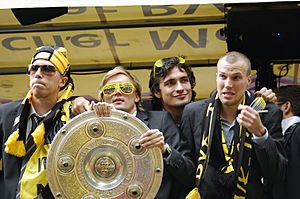
In the 2009–10 season, Klopp's Dortmund improved. They finished fifth in the Bundesliga and qualified for the UEFA Europa League.
For the 2010–11 season, Dortmund had a young and energetic team. In December 2010, Borussia became "Autumn Champion" (the league leader at the winter break). They did this three matches before the break, setting a record. On April 30, 2011, the club beat 1. FC Nürnberg 2–0 at home. Second-place Bayer Leverkusen lost, giving Dortmund an eight-point lead with two games left. This championship was their seventh national title. It also gave them a spot in the 2011–12 Champions League group stages.
One year later, Dortmund successfully defended their Bundesliga title. They won against Borussia Mönchengladbach on the 32nd match day. By the final match day, Dortmund had set a new record with 81 points in one Bundesliga season. This was the club's fifth Bundesliga title and eighth German championship overall. This allowed them to wear two stars above their crest. The club finished its successful 2011–12 season by winning the double for the first time. They beat Bayern 5–2 in the final of the DFB-Pokal. Borussia Dortmund is one of only four German clubs to win both the Bundesliga and DFB-Pokal in the same season.
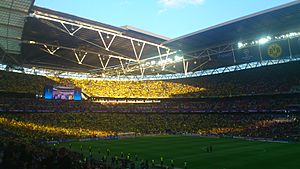
Borussia Dortmund finished the 2012–13 season in second place in the Bundesliga. Bayern Munich won the league with a record 91 points. In the UEFA Champions League, Dortmund beat Real Madrid in the semi-finals. They won the home game 4-1 and lost the away game 0-2, but still advanced. Dortmund played in their second UEFA Champions League final against Bayern Munich. This was the first all-German final. It took place at Wembley Stadium on May 25, 2013, and Dortmund lost 2–1.
In the 2013–14 season, Borussia Dortmund won the 2013 DFL-Supercup 4–2 against Bayern Munich. The season started well with five straight wins. However, injuries to key players caused them to drop in the table. They reached the quarter-finals of the Champions League, losing to Real Madrid. Dortmund finished second in the Bundesliga and reached the 2014 DFB-Pokal final, losing 0–2 to Bayern in extra time.
Dortmund started the 2014–15 season by beating Bayern 2–0 in the 2014 DFL-Supercup. But their league performance was inconsistent. They even fell to the bottom of the table at times during the winter. However, they climbed out of the relegation zone with four wins in February. On April 15, 2015, Jürgen Klopp announced he would leave Dortmund after seven years. Four days later, Thomas Tuchel was named as his replacement. Klopp's final season ended with the team finishing seventh. They also reached the DFB-Pokal final and qualified for the 2015–16 Europa League.
After Klopp: New Coaches and Challenges
In the 2015–16 season, Dortmund started strong, winning their first five league games. They were at the top of the Bundesliga for a while. They finished as the best Bundesliga runner-up team ever, winning 24 out of 34 games. In the Europa League, they reached the quarter-finals. They were knocked out by Jürgen Klopp's Liverpool in a dramatic comeback. In the 2015–16 DFB-Pokal, Dortmund reached the final for the third year in a row. They lost to Bayern Munich on penalties.
On April 11, 2017, an incident occurred near the team's bus on its way to a Champions League match. Defender Marc Bartra was injured. Dortmund lost the game 2–3 to AS Monaco. They were eliminated from the Champions League after losing the second leg. On April 26, Dortmund beat Bayern Munich 3–2 to reach the 2017 DFB-Pokal final. This was their fourth final in a row. On May 27, Dortmund won the 2016–17 DFB-Pokal 2–1 against Eintracht Frankfurt.
Before the 2017–18 season, Thomas Tuchel left as manager. Peter Bosz was hired. He had a record-breaking start but then the team went 20 games without a win. He was then replaced by Peter Stöger as interim coach. During that season, Pierre-Emerick Aubameyang and Bartra left the club. Stöger led Dortmund to a fourth-place finish in the Bundesliga before stepping down.
In the summer of 2018, Dortmund hired Lucien Favre as their new coach. After signing eight new players, Dortmund played very well. They challenged Bayern Munich for the league title until the very last match day, finishing just two points behind. This earned Favre a contract extension. A documentary series called Inside Borussia Dortmund was made about this season.
The next season, Dortmund made some big signings hoping to win the Bundesliga. They won the DFL Supercup, but no other trophies. They were knocked out of both the DFB-Pokal and the UEFA Champions League. The season was stopped because of the COVID-19 pandemic in Germany. When it restarted, Dortmund played better, but Bayern Munich still won the Bundesliga. Dortmund finished second in the 2019–20 season.
Dortmund had a shaky start to the 2020–21 season. They lost the DFL-Supercup and had mixed results in the Champions League and Bundesliga. After a 5–1 loss to Stuttgart, Lucien Favre was fired. Assistant manager Edin Terzić became the caretaker coach. Under Terzić, Dortmund finished third in the Bundesliga. They were eliminated in the Champions League quarter-finals by Manchester City. The team then won the DFB-Pokal, defeating RB Leipzig 4–1 in the final.
Marco Rose became manager for the 2021–22 season. Terzić became the club's new technical director. Rose led the club to a second-place finish in the league. He was sacked before the 2022–23 season, and Terzić was reappointed as manager. Before the final match day of that season, Dortmund was at the top of the league. However, they lost the Bundesliga title to Bayern Munich on goal difference after a 2–2 home draw against Mainz.
After selling star player Jude Bellingham to Real Madrid for €103 million, Dortmund had a tough Bundesliga season in 2023–24, finishing fifth. But they did very well in the UEFA Champions League. They beat PSV Eindhoven, Atlético Madrid, and PSG to reach the final for the first time in eleven years. They lost the final 2–0 to Real Madrid.
In the 2024-25 season, BVB reached the quarter-finals of the 2025 FIFA Club World Cup. They were defeated by Real Madrid.
Club Identity and Supporters
Borussia Dortmund supporters are known for being very passionate. The club and its fans work to promote positive values. They organize educational trips to places like former concentration camps. They also support programs that teach about anti-racism and democracy. The club has donated a lot of money to organizations that remember the Holocaust. Officially recognized BVB fan clubs must agree to reject extreme ideas and support Germany's constitution. The club also has initiatives like "No Beer for Racists" to spread messages against prejudice in fan culture.
Home Grounds: Where BVB Plays and Trains
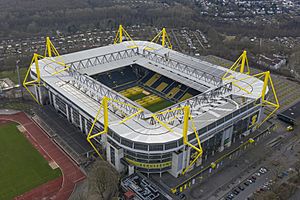
Stadiums: Signal Iduna Park
The Westfalenstadion is Borussia Dortmund's home stadium. It is Germany's largest stadium and the seventh-largest in Europe. The stadium is called "Signal Iduna Park" because an insurance company bought the naming rights. However, for FIFA and UEFA events, it uses names like "FIFA World Cup Stadium, Dortmund" or "BVB Stadion Dortmund." This is because these organizations do not allow corporate sponsorships from companies that are not official tournament partners.
The stadium can hold up to 81,359 fans for league matches. For international matches, it holds 65,829 seated fans. The famous southern grandstand, known as the "Yellow Wall," is re-equipped with seats for international games to meet FIFA rules.
In 1974, the Westfalenstadion replaced the Stadion Rote Erde. The old stadium is next door and is now used by Borussia Dortmund II. Borussia Dortmund became very popular in the 1960s, and their old ground was too small. The city of Dortmund could not afford a new stadium. But in 1971, Dortmund was chosen to host games for the 1974 FIFA World Cup. The money meant for a stadium in Cologne was given to Dortmund instead, making the new stadium possible.
The Westfalenstadion has been renovated several times to make it bigger. In 2008, the Borusseum, a museum about Borussia Dortmund, opened in the stadium. In 2011, Borussia Dortmund partnered with Q-Cells. They installed solar cells on the stadium roof to generate electricity.
Borussia Dortmund has the highest average attendance of any football club worldwide. In 2014, about 1,000 British fans attended each home game. They were drawn by the lower ticket prices compared to the Premier League.
Training Ground: Hohenbuschei
Borussia Dortmund's training ground and academy are at Hohenbuschei in Brackel, a district of Dortmund. This complex has areas for physical fitness and recovery. It also has rooms for physiotherapy and massage, plus pools for therapy. There are also saunas, steam rooms, weight rooms, classrooms, and offices. The facility includes a restaurant and a TV studio for interviews.
Outside, there are five grass pitches, two with under-soil heating. There is also one artificial grass field, three small grass pitches, and a multi-functional sports arena. The site covers a total area of 18,000 square meters. The club also owns a Footbonaut, which is a training robot. It is a 14 square meter training cage.
The training complex and youth performance center in Hohenbuschei have been expanded. This makes BVB one of the best-equipped football clubs in Germany for its facilities. The Strobelallee Training Centre is used by the BVB Evonik Football Academy. The Bundesliga team used to train there.
Club Finances and Organization
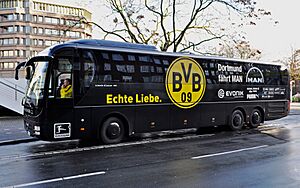
Borussia Dortmund e.V. is managed by its board. This board includes president Dr. Reinhard Rauball, vice-president Gerd Pieper, and treasurer Dr. Reinhold Lunow.
The professional football part of Dortmund is run by Borussia Dortmund GmbH & Co. KGaA. This is a special type of company. The sports club, Borussia Dortmund e.V., fully owns Borussia Dortmund GmbH. This structure ensures the sports club controls the professional team.
Borussia Dortmund GmbH & Co. KGaA shares were first sold on the stock market in October 2000. It was the first German sports club to do this. The sports club, Borussia Dortmund e.V., owns 4.61% of the shares. Other owners include Bernd Geske (8.24%) and many other shareholders (67.24%). Hans-Joachim Watzke is the CEO and Thomas Treß is the CFO. Michael Zorc is the sporting director. He is in charge of the first team, coaches, youth sections, and scouting.
Team Kits and Sponsors
Dortmund's main advertising partner and shirt sponsor is Evonik. Since the 2012–13 season, their main equipment supplier has been Puma. The club also has a deal with Opel as their sleeve sponsor.
Dortmund has different levels of partners. BVBChampionPartner includes companies like Opel, bwin, and Wilo. BVBPartner includes MAN, Eurowings, and Coca-Cola. BVBProduktPartner includes ofo and TEDi. Since 2012, Brixental in Austria is also a BVB sponsor. It also hosts one of their summer training camps.
Sponsors Over Time
|
|
|
Charity Work: BVB Giving Back
Borussia Dortmund has raised money for many good causes. In May 2011, they held a charity game for the 2011 Japan earthquake and tsunami victims. Ticket sales and €1 million from their sponsor Evonik went to help. In November 2012, Borussia Dortmund KGaA started a charity trust called leuchte auf. It helps social projects financially. The trust's logo is a star made from the streets that meet at Dortmund's Borsigplatz, where the club was founded.
In July 2013, Borussia Dortmund held another charity game. This one raised money for victims of the 2013 German floods. In March 2020, Borussia Dortmund, Bayern Munich, RB Leipzig, and Bayer Leverkusen gave €20 million together. This helped other German football teams that were struggling during the COVID-19 pandemic. Since 1996, during Advent, Borussia Dortmund players visit the children's hospital in Dortmund. They meet patients and give them gifts.
Players: Meet the Team
Current Squad
|
|
Players on Loan
|
Club Captains: Leaders of the Team
Since 1963, 19 players have been club captain for Borussia Dortmund. The first captain in the Bundesliga era was Alfred Schmidt (1963–1965). The longest-serving captain was Michael Zorc, from 1988 to 1998. He won the most trophies as captain: two Bundesliga titles, one DFB-Pokal, three DFL-Supercups, and one UEFA Champions League.
The current club captain is Emre Can. He took over after Marco Reus stepped down for the 2023–24 season.

| Dates | Name | Notes |
|---|---|---|
| 1963–1965 | First club captain in the Bundesliga era | |
| 1965–1968 | ||
| 1968–1971 | ||
| 1971–1974 | ||
| 1974–1977 | ||
| 1977–1979 | ||
| 1979–1983 | ||
| 1983–1985 | ||
| 1985–1987 | ||
| 1987–1988 | ||
| 1988–1998 | Longest-serving captain in Borussia Dortmund's history | |
| 1998–2003 | ||
| 2003–2004 | ||
| 2004–2008 | ||
| 2008–2014 | ||
| 2014–2016 | ||
| 2016–2018 | ||
| 2018–2023 | ||
| 2023–present |
Coaching Staff: The People Behind the Team
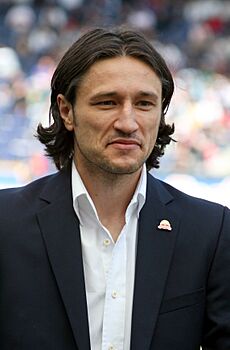
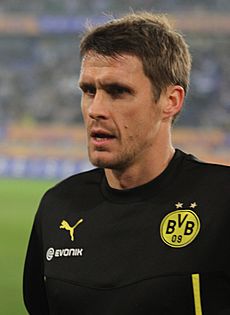
Head Coaches: Leading the Way
In July 1935, Fritz Thelen became the club's first full-time head coach. However, player Ernst Kuzorra had to take over for a few months. In 1966, Willi Multhaup led his team to win the European Cup Winners' Cup. This was the first time a German team won a European trophy. Horst Köppel brought major silverware to the club in 1989, winning the DFB-Pokal.
Ottmar Hitzfeld is the club's most successful coach. He won the Bundesliga and Supercup twice. In 1997, Hitzfeld led Dortmund to an unexpected win in the Champions League. Dortmund also won the Intercontinental Cup in 1997. Coach Nevio Scala became the first non-German speaker to win a major title for the club. In 2001–02, Matthias Sammer, a former BVB player, brought the league title back to Dortmund.
In 2008–09, the club hired Jürgen Klopp. He won the club's seventh championship title in 2010–11. In his fourth season, Dortmund won both the Bundesliga and the DFB-Pokal. This was the first time the club won the league and cup double. His successor, Thomas Tuchel, won the 2016–17 DFB-Pokal.
On May 22, 2018, Lucien Favre became the new head coach. He won the 2019 DFL-Supercup in August 2019. On December 12, 2020, Dortmund lost 5–1 to Stuttgart. Favre was fired the next day. Edin Terzić became the interim coach and won the DFB-Pokal. Marco Rose was manager for the 2021–22 season. Terzić was reappointed manager in May 2022. Nuri Şahin took over in June 2024, followed by interim coach Mike Tullberg in January 2025. Niko Kovač became the head coach in February 2025.
| No. | Nationality | Head coach | From | Until | Honours won |
|---|---|---|---|---|---|
| 1 | Ernst Kuzorra (interim) | July 1935 | Aug 1935 | ||
| 2 | Fritz Thelen | Sept 1935 | June 1936 | ||
| 3 | Ferdinand Swatosch | July 1936 | May 1939 | ||
| 4 | Willi Sevcik | June 1939 | unknown | ||
| 5 | Fritz Thelen | 10 January 1946 | 31 July 1946 | ||
| 6 | Ferdinand Fabra | 1 August 1946 | 31 July 1948 | 1 Oberliga West | |
| 7 | Eduard Havlicek | 1 August 1948 | 31 July 1950 | 2 Oberliga West | |
| 8 | Hans-Josef Kretschmann | 1 August 1950 | 31 July 1951 | ||
| 9 | Hans Schmidt | 1 August 1951 | 31 July 1955 | 1 Oberliga West | |
| 10 | Helmut Schneider | 1 August 1955 | 31 July 1957 | 2 Oberliga West, 2 Championships | |
| 11 | Hans Tauchert | 1 August 1957 | 24 June 1958 | ||
| 12 | Max Merkel | 14 July 1958 | 31 July 1961 | ||
| 13 | Hermann Eppenhoff | 1 August 1961 | 30 June 1965 | 1 Championship, 1 Cup | |
| 14 | Willi Multhaup | 1 July 1965 | 30 June 1966 | 1 European Cup Winners' Cup | |
| 15 | Heinz Murach | 1 July 1966 | 10 April 1968 | ||
| 16 | Oswald Pfau | 18 April 1968 | 16 December 1968 | ||
| 17 | Helmut Schneider | 17 December 1968 | 17 March 1969 | ||
| 18 | Hermann Lindemann | 21 March 1969 | 30 June 1970 | ||
| 19 | Horst Witzler | 1 July 1970 | 21 December 1971 | ||
| 20 | Herbert Burdenski | 3 January 1972 | 30 June 1972 | ||
| 21 | Detlev Brüggemann | 1 July 1972 | 31 October 1972 | ||
| 22 | Max Michallek | 1 November 1972 | 1 March 1973 | ||
| 23 | Dieter Kurrat | 1 March 1973 | 30 June 1973 | ||
| 24 | János Bédl | 1 July 1973 | 14 February 1974 | ||
| 25 | Dieter Kurrat | 14 February 1974 | 30 June 1974 | ||
| 26 | Otto Knefler | 1 July 1974 | 1 February 1976 | ||
| 27 | Horst Buhtz | 1 February 1976 | 30 June 1976 | ||
| 28 | Otto Rehhagel | 1 July 1976 | 30 April 1978 | ||
| 29 | Carl-Heinz Rühl | 1 July 1978 | 29 April 1979 | ||
| 30 | Uli Maslo | 30 April 1979 | 30 June 1979 | ||
| 31 | Udo Lattek | 1 July 1979 | 10 May 1981 | ||
| 32 | Rolf Bock (interim) | 11 May 1981 | 30 June 1981 | ||
| 33 | Branko Zebec | 1 July 1981 | 30 June 1982 | ||
| 34 | Karl-Heinz Feldkamp | 1 July 1982 | 5 April 1983 | ||
| 35 | Helmut Witte (interim) | 6 April 1983 | 30 June 1983 | ||
| 36 | Uli Maslo | 1 July 1983 | 23 October 1983 | ||
| 37 | Helmut Witte (interim) | 23 October 1983 | 31 October 1983 | ||
| 38 | Heinz-Dieter Tippenhauer | 31 October 1983 | 15 November 1983 | ||
| 39 | Horst Franz | 16 November 1983 | 30 June 1984 | ||
| 40 | Timo Konietzka | 1 July 1984 | 24 October 1984 | ||
| 41 | Reinhard Saftig (interim) | 25 October 1984 | 27 October 1984 | ||
| 42 | Erich Ribbeck | 28 October 1984 | 30 June 1985 | ||
| 43 | Pál Csernai | 1 July 1985 | 20 April 1986 | ||
| 44 | Reinhard Saftig | 21 April 1986 | 30 June 1988 | ||
| 45 | Horst Köppel | 1 July 1988 | 30 June 1991 | 1 Cup, 1 Supercup | |
| 46 | Ottmar Hitzfeld | 1 July 1991 | 30 June 1997 | 2 Championships, 2 Supercups, 1 Champions League | |
| 47 | Nevio Scala | 1 July 1997 | 30 June 1998 | 1 Intercontinental Cup | |
| 48 | Michael Skibbe | 1 July 1998 | 4 February 2000 | ||
| 49 | Bernd Krauss | 6 February 2000 | 13 April 2000 | ||
| 50 | Udo Lattek (interim) | 14 April 2000 | 30 June 2000 | ||
| 51 | Matthias Sammer | 1 July 2000 | 30 June 2004 | 1 Championship | |
| 52 | Bert van Marwijk | 1 July 2004 | 18 December 2006 | ||
| 53 | Jürgen Röber | 19 December 2006 | 12 March 2007 | ||
| 54 | Thomas Doll | 13 March 2007 | 19 May 2008 | ||
| 55 | Jürgen Klopp | 1 July 2008 | 30 June 2015 | 2 Championships, 1 Cup, 2 Supercups | |
| 56 | Thomas Tuchel | 1 July 2015 | 30 May 2017 | 1 Cup | |
| 57 | Peter Bosz | 1 July 2017 | 10 December 2017 | ||
| 58 | Peter Stöger | 10 December 2017 | 30 June 2018 | ||
| 59 | Lucien Favre | 1 July 2018 | 13 December 2020 | 1 Supercup | |
| 60 | Edin Terzić (interim) | 13 December 2020 | 30 June 2021 | 1 Cup | |
| 61 | Marco Rose | 1 July 2021 | 20 May 2022 | ||
| 62 | Edin Terzić | 23 May 2022 | 13 June 2024 | ||
| 63 | Nuri Şahin | 14 June 2024 | 22 January 2025 | ||
| 64 | Mike Tullberg (interim) | 22 January 2025 | 2 February 2025 | ||
| 65 | Niko Kovač | 2 February 2025 |
Records: BVB's Achievements and Milestones
Borussia Dortmund holds several records in the Bundesliga and European competitions:
- The player with the most appearances for Borussia Dortmund is Michael Zorc, with 572 games.
- The player with the most goals for Borussia Dortmund is Alfred Preissler, with 177 goals.
- The highest-scoring UEFA Champions League match ever had 12 goals. Dortmund beat Legia Warsaw 8–4 in the 2016–17 season.
- Youssoufa Moukoko became the youngest player in Bundesliga history. He was 16 years and 1 day old when he played against Hertha BSC in November 2020.
- Moukoko also became the youngest player in UEFA Champions League history. He was 16 years and 18 days old when he played against Zenit Saint Petersburg in December 2020.
- Moukoko became the youngest goalscorer in Bundesliga history. He was 16 years and 28 days old when he scored against Union Berlin in December 2020.
- Dortmund was part of the biggest loss ever in a Bundesliga match. They lost 12–0 away to Borussia Mönchengladbach in April 1978.
- BVB and Bayern Munich received a record 15 cards in one match (3 for Dortmund, 12 for Bayern) in April 2001.
- The most penalties given in a Bundesliga match was five. This happened in a game between Borussia Mönchengladbach and Dortmund in November 1965.
- The first goal ever scored in Bundesliga play was by Dortmund's Friedhelm Konietzka. It was against Werder Bremen, but Werder Bremen won 3–2.
- Former Borussia Dortmund striker Pierre-Emerick Aubameyang is one of only three players to score in ten straight Bundesliga matchdays. He was also the first player to score in the first eight matchdays of a Bundesliga season.
Honours: BVB's Trophies
| Type | Competition | Titles | Seasons |
|---|---|---|---|
| Domestic | German Champions/ Bundesliga | 8 | 1956, 1957, 1963, 1994–95, 1995–96, 2001–02, 2010–11, 2011–12 |
| DFB-Pokal | 5 | 1964–65, 1988–89, 2011–12, 2016–17, 2020–21 | |
| DFL-Supercup | 6 | 1989, 1995, 1996, 2013, 2014, 2019 | |
| Continental | UEFA Champions League | 1 | 1996–97 |
| UEF Cup Winners' Cup | 1 | 1965–66 | |
| Worldwide | Intercontinental Cup | 1 | 1997 |
Regional Titles
- Oberliga West/West German Championship:
- Winners: 1947–48, 1948–49, 1949–50, 1952–53, 1955–56, 1956–57 (record)
- Westphalia Cup:
- Winners: 1947
Individual Player Awards
- 1996: Matthias Sammer
Golden Boy
- 2011: Mario Götze
- 2020: Erling Haaland
- 2023: Jude Bellingham
Affiliated Clubs: BVB's Global Connections
Borussia Dortmund has partnerships with these clubs:
 Hyderabad
Hyderabad Buriram United
Buriram United Marconi Stallions
Marconi Stallions Iwate Grulla Morioka
Iwate Grulla Morioka Hoa Binh
Hoa Binh BVB International Academy Waterloo
BVB International Academy Waterloo Aris Thessalonikis
Aris Thessalonikis Persib Bandung
Persib Bandung Pittsburgh Steelers
Pittsburgh Steelers
Women's Team
Borussia Dortmund also has a women's team. This team plays in the Frauen-Westfalenliga. This is one of the regional leagues in the fourth tier of the German women's football league system.
See also
 In Spanish: Borussia Dortmund para niños
In Spanish: Borussia Dortmund para niños
- Borussia Dortmund II
- Borussia Dortmund (women)
- Borussia Dortmund Youth Sector
- List of Borussia Dortmund seasons
- List of world champion football clubs


